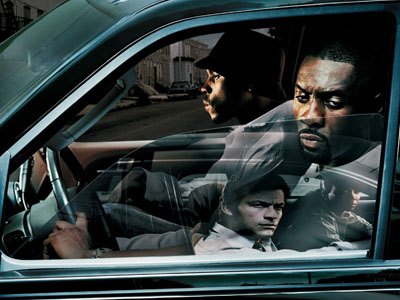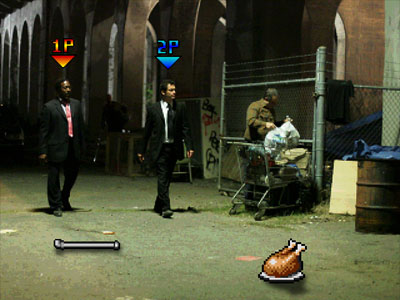
HBO’s gritty crime drama (“but it’s so much more than that…”) The Wire has gained a devoted following over the course of its five season run. If you’re already a convert, I won’t need to reiterate how far it stands apart from the typical procedural cop show, and how in terms of detail and structure is more like a filmed novel. You’ll already know that nearly every character is written and played engagingly and sympathetically, as if the sparingly-used ‘fan favourite’ characters from a dozen other shows have been concentrated into a single narrative, while still having completely believeable motivations. If you still need convincing, Charlie Brooker’s tireless evangelising of the show might sway you.
The brainchild of journalist David Simon and ex-detective/teacher Ed Burns, The Wire lifts the lid on the impoverished and crime-ravaged urban centre of Baltimore, Maryland, where police work is not neatly packaged with the villain led away in bracelets at the end of each episode. Characters responsible for morally indefensible (often violent) acts are portrayed as everyday people with mundane concerns, attempting to reconcile their circumstances with a normal life. Initially focusing on the city’s ascendant drug empire (the Barksdale Organisation) and the investigative unit tasked with bringing them down (initially placing a tactical emphasis on telephone surveilance, hence the show’s title), each series introduces new factions (politicians, press, blue collar workers, the public school system) into the mix.
Before The Wire came along, I had long written off TV as an entertainment medium with any untapped potential. I assumed that commercial pressures and perceived audience tastes condemned the box to offering slick but ultimately disposable amusements such as Lost, Life on Mars and Arrested Development. Looking at post-Wire TV output sadly suggests that this is still largely true, although the show was a reminder that there are still some enclaves within that industry prepared to nurture more sophisticated fare.
The Wire’s fictionalised version of Baltimore is a complex network of institutions and social groups, each to a greater or lesser extent dysfunctional and (barely) held together by the concerted actions of diverse characters with their own agendas. This sounds to me like fertile material for adaptation to a video game. Of course any such suggestion would undoubtedly be met with dismissive sneering, as we’re all weary of the the typically poor treatment of TV and film licenses (GoldenEye 007 and Chronicles of Riddick being rare exceptions). Assuming for a moment that The Wire license ended up in capable hands, and that it would be worth at least trying to do justice to the source material instead of perpetuating the status quo, what sort of game would work?
All in the Game
At first glance it might seem that the drugs-and-crime subject matter would lend itself well to a GTA clone. This would be a mistake of a similar magnitude to the (notoriously awful) adaptation of Fight Club as a fighting game. The show makes a point of portraying police work (and crime, and politics) as tedious, bureaucratic and influenced by uncontrollable external factors to a degree that would make for unrewarding gameplay.
So if car chases and shootouts aren’t on the menu, what elements of the show would translate into interesting activity? Perhaps a more abstracted simulation of The Wire’s model of Baltimore would work. Taking control of one of the factions (the Barksdales, the Major Crimes Unit, the Dockers, Marlo’s crew, etc.), and making high level strategic decisions to achieve their goals. This starts to look like a turn-based strategy or management game, influenced by tabletop and board games (Risk, Diplomacy) as well as computer games where you have to earn the trust and cooperation of AI-controlled agents (Shogun, Midwinter, Phoenix Wright, Civilisation) rather than simply buying and selling ‘units’. This would also allow ‘lone wolf’ characters (Bubbles, Omar, The Deacon), whose role would be quite limited to play directly, to be interacted with by the player.
Something of this ilk, lacking 3D environments or realtime action gameplay, would be a hard sell as a retail PC or console game. With a suitably lightweight interface it might be better suited to implementation as a web game. If the game was able to support multiple players, with turns carried out asynchronously, and could be resolved in a fixed number of turns, then it starts to look like one of those fashionable social games that would be interfaced through social networks like Facebook. Having the plotting and backstabbing in the game take place between people who know each other in real life would make it much more compelling.
Taking the web-based approach wouldn’t necessarily mean skimping on the production values. It might be possible to integrate streaming video into the game. Clips from the show could be used to introduce characters and illustrate pivotal plot developments, or new in-character footage could be shot to knit together the game events with the ‘official’ story (assuming there was some reason for someone to throw money around – perhaps the show finally being picked up by a UK network?). Video would need to be used sparingly, and be able to be switched off without affecting gameplay – nobody would want a return to the horrors of the early 1990s ‘interactive movie’ era.
Care would need to be taken regarding how much freedom there would be for the events in the game to deviate from the plot of the show. It would also be necessary to balance the number-crunching aspect of the simulation with the actions of the characters. Too much book-keeping and the game becomes a reskin of Drug Wars, too much character-driven drama would lead to a glorified Choose Your Own Adventure story.
Alternatively
There is only one other genre which would allow an intellectual property like The Wire to truly shine as a video game. I’m talking of course about the scrolling beat-’em-up: the pure, mindlessly thrilling, usually four-player brawlers like Captain Commando, Vendetta and Final Fight that dominated the arcade before the rise of polygonal 3D. No, seriously, it would totally work.
I’d like to see a CPS2 game that pitted absurdly-physiqued versions of McNulty, Kima, Herc and Carver against waves of palette-swapped thugs, dockers and dope fiends. There would of course need to be loads of cameos from other characters: calling in a ‘Special Attack’ (a la Streets of Rage, Golden Axe) might summon Tony Colichio and the rest of the Western hardnuts to book everyone on screen. Entering the right button combo might summon Prez to unexpectedly chin the end of level boss. Larger than life villains like Brother Mouzone, Marlo, Omar and Chris and Snoop are practically end of stage bosses already.
Between levels you could have minigames – help Bubbles put the red hat on the mopes; pick the container that hides Valchek’s surveillance van; or even, you know, do the whole wiretapping thing with Lester Freamon. The Greek could occasionally pop up in the background like the G-Man from Half-Life…
I’ve probably thought about this too much.

Tags: adaptation, beat-'em-up, HBO, intellectual property, licensing, pitch, social games, strategy, television, The Wire
